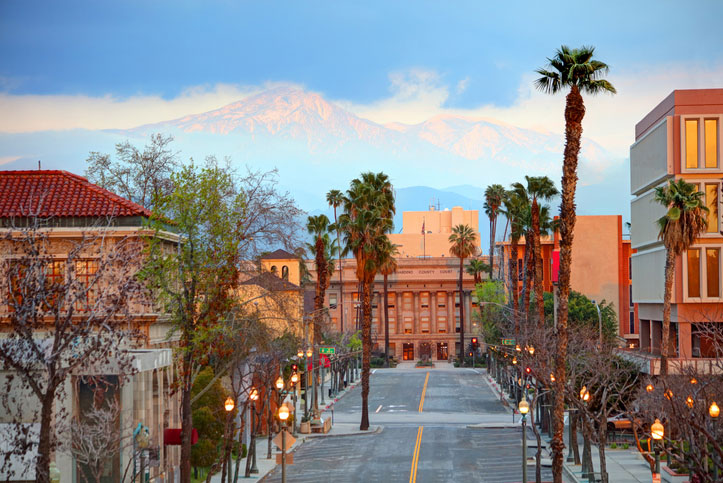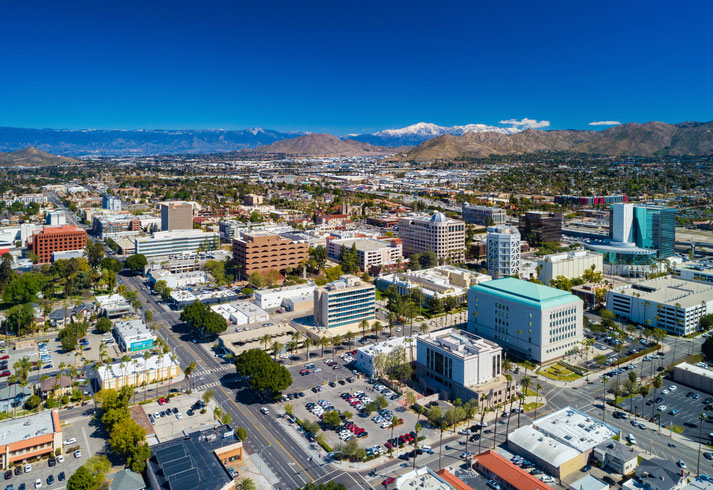Written by Helen Lewis

San Bernardino, CA offers a growing landscape for aspiring counselors, therapists, and researchers. With nearby master’s programs and plenty of opportunities in the field, it’s a great place to pursue a career in psychology. This area also highlights the benefits of earning a master’s degree and offers other valuable insights for those looking to make an impact in mental health care.
Welcome to San Bernardino, California
Located in the Inland Empire of sunny southern California, San Bernardino has a population of about 222,100 residents. Among other things, this warm city is known for being home to fantastic educational institutions, including California State University, San Bernardino, a public university with around 20,000 students (combined undergraduate and graduate), and Loma Linda University.
Up to 5,000 residents work at the Loma Linda University Medical Center, a teaching hospital with more than 900 qualified working physicians.
Mental Health Care in San Bernardino, CA
California’s mental health care system has been a focal point for local politics for years, particularly since the onset of the COVID-19 pandemic revealed the shortcomings in the system as it already existed.
Today, one of the largest issues in California mental health care is understaffing.
According to the Bureau of Labor Statistics (BLS), there are less than 17,000 employed psychologists in California working in clinical, counseling, and school settings. In a state that is home to almost 39 million people, this is a remarkably small number!
Since the passage of Proposition 1 in California, the mental health care system is in a state of flux, as funding for mental health care facilities is redistributed from the county to the state level.
Though uncertainty remains in terms of exactly what mental health care in California will look like from an institutional vantage, BLS statistics estimate that occupations in mental health will grow by up to 18% by 2032.
Job growth in the field of psychology is growing particularly quickly. A projected 14,000 psychology jobs will spring up between 2024 and 2033, meaning a 7% growth rate – what the BLS terms “faster than the average for all occupations.” Below are jobs for psychologists in the United States that are expected to increase hiring over the next decade, listed in order of most to least projected growth:
- Substance abuse, behavioral disorder, and mental health counselors
- Marriage and family therapists
- Community health workers
- Clinical and counseling psychologists
- Psychiatric technicians and aides
- Social and human service assistants
- Social workers
- Psychiatrists
- Educational, guidance, and career counselors and advisors
The Path to Becoming a Psychologist in California
Psychologists in California tend to be among the most generously compensated in the United States.
This field combines rewarding, socially conscious work and a comfortable living. It also allows for a great amount of versatility: psychologists typically choose specializations – focused areas of expertise, ranging from child and adolescent psychology to addiction counseling, pedagogy, and research.
However, it’s generally unlikely that an individual would be able to pursue jobs in psychology without an advanced degree in the subject, or a license. But what does that process look like?
First, it’s generally the case that aspiring psychologists will need a bachelor’s degree from an accredited institution. While it helps down the line if these degrees are in psychology, it’s not impossible to get into graduate-level programs in psychology without them.
Next, most professions in psychology will require individuals to have either a master’s or doctorate degree. Doctorates tend to allow for the most versatility, and are required for a number of positions, including clinical psychology. However, there are also a number of positions available to individuals with master’s degrees in psychology, meaning that individuals with less available time or financial resources can also embark upon rewarding careers with this qualification.
After graduating from a master’s or doctorate program, it’s necessary to obtain a license. However, there are a few steps that need to be completed before sending in a license application:
- Complete a designated number of hours of supervised internship, residency, or fieldwork. Applicants must have a total of 3,000 hours of supervised professional experience, half of which needs to have been completed after graduation. The other half is typically completed during the duration of graduate study.
- Successfully pass the Examination for Professional Practice in Psychology (EPPP)
- Pass the California Laws and Ethics Examination (CPLEE)
- Complete a background check
Upon finishing all of these steps, an individual can then apply for their psychology license. When their license has been granted, the individual is able to begin practicing as a licensed psychologist.
Master’s Degree Programs Near San Bernardino

In the field of psychology, there are two Master’s degree options available: a Master of Science (MS) and a Master of Arts (MA). MA programs are focused on theoretical and practical applications of psychology, particularly in relation to direct patient care in the form of therapy and counseling. MS programs are designed for students who are eager to do psychology-centered research, and involve skills related to quantitative reasoning and lab work.
There are many degree programs in psychology available across the Golden State, running all along from southern to northern California. Below is a non-exhaustive list of master’s degree-granting programs near San Bernardino, CA, namely:
- American School of Professional Psychology at Argosy University: MA/MS programs in Clinical Psychology; Counseling Psychology; Forensic Psychology; and Sport-Exercise Psychology
- Claremont: MA in Applied Social Psychology; Organizational Behavior; Positive Organizational Psychology; Applied Developmental; Positive Developmental; Applied Cognitive; Health Behavior Research; and Public Policy
- Fielding Institute: MA in Media Psych and Social Change
- Loyola Marymount: MA in Educational Psychology
- Mount St. Mary’s College: MS in Counseling, MA in Mental Health Administration
- Pepperdine: MA in Clinical Psychology
- California Polytechnic (Cal Poly) State University, San Luis Obispo: MA/MS in Marriage and Family Therapy and Clinical Psychology
- California State University, Long Beach: MS in Human Factors and Industrial-Organizational Psychology; MA in Psychological Research
- California State University, San Diego/UC San Diego: MA in Psychology; MS in Applied Psychology
Why Pursue a Master’s in Psychology?
What are the benefits of pursuing an MA or MS in psychology?
For one thing, Master’s degrees in psychology are a wonderful pathway to meaningful work in mental health care, without the time or financial commitment of a doctorate program, which can last between five and seven years.
A Master’s degree in psychology allows aspiring psychologists to pursue jobs like counselors, therapists, school psychologists, social workers, sports psychologists, industrial-organizational psychologists, and sports psychologists. In some situations, having an MA or MS could be sufficient to qualify for a role in forensic psychology, though a doctoral degree is sometimes required for these positions.
Jobs for Psychologists: A Versatile Role
As a licensed psychologist, individuals have the ability to pursue a wide range of jobs. Candidates with Psyd or Phd qualifications have the widest array of choices in this field, but – as the previous section touches upon – those with Master’s degrees can also choose from a strong selection of available, well-compensated roles that bridge advanced academic study and effective work in mental health care.
A non-exhaustive list of jobs for psychologists include:
- Child psychologist: Supporting young people dealing with permanent or situational emotional, cognitive, or developmental challenges
- Forensic psychologist: Works within the legal system, with tasks like evaluating the mental state of people like criminal defendants, individuals convicted of crimes, and eyewitnesses
- Researcher: Utilizes a background in psychology to conduct important studies about topics related to mental health, the brain, and human behavior, such as cognition, memory, mental illness, and socialization.
- Substance abuse counselor: Professionals who specialize in the treatment of addiction. These individuals may work in a wide range of settings, from clinical environments to private practices.
- Educational psychiatrist: High-level mental health professionals who study the ways in which people learn, with a concentration on things like developing effective curricula and conducting research.
How Much Do Psychologists in San Bernardino Earn?
San Bernardino is one of the top 10 highest-paying metropolitan areas in the United States for qualified psychologists.
In the field of “psychologists, all other” – a designation from the Bureau of Labor Statistics intended to refer to any surveyed psychologist who is not a clinical, counseling, or school psychologist – mental health professionals with this title earned, on average, $127,760 in the Riverside-San Bernardino-Ontario area in 2023.
Clinical and counseling psychologists earned more, with an average annual income of $134,380.
Finally, school psychologists were on the low end, earning a mean salary of $118,580. These workers still earned well above the average salary in San Bernardino, which was $61,930 in 2023.
2023 US Bureau of Labor Statistics salary and employment figures reflect state data, not school-specific information. Conditions in your area may vary. Data accessed October 2024.
